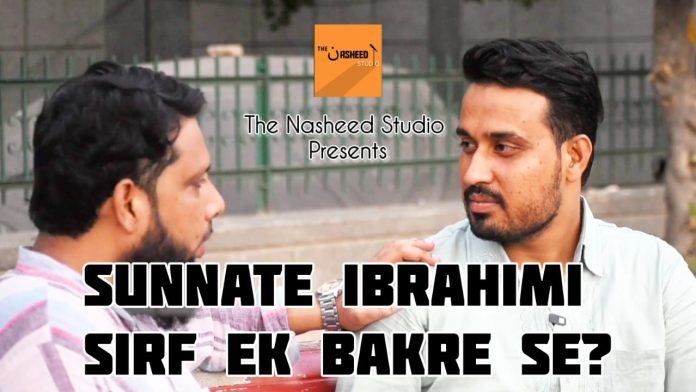– Yusra Firdaus
The film, “Sunnate Ibrahimi Sirf Ek Bakre Se?” presented by The Nasheed Studio, discusses the broader implications of religious sacrifices in the context of Eid al-Adha.
The film, written and directed by Salahuddin Ahmad, is acted by Salahuddin Ahmad and G.H. Khan, while cinematography and editing done by Khalid Niyazi.
The film delves into an emotional conversation between two individuals about the deeper significance of religious sacrifices, particularly in the context of Eid al-Adha. The speaker, G.H. Khan, is visibly troubled and expresses regret over being unable to perform the traditional act of sacrificing a goat this year. His friend, Salahuddin Ahmad, offers solace by explaining that Prophet Ibrahim’s legacy is not limited to the ritualistic sacrifice of an animal. Instead, it encompasses a broader, more profound commitment to spiritual and moral values. Prophet Ibrahim’s first and foremost sacrifice was his rejection of his family’s idolatrous practices and his unwavering acceptance of monotheism. This act of breaking away from societal and familial expectations to follow God’s command demonstrates the importance of prioritizing divine guidance over social conformity.
The friend explains that true adherence to Prophet Ibrahim’s example involves more than just the physical act of sacrifice. It requires a heartfelt dedication to purify one’s inner self by abandoning negative traits such as jealousy, pride, hatred, and hypocrisy. These internal sacrifices are crucial for nurturing a sincere and devout relationship with God. He emphasizes that everyone, regardless of their financial means, can perform these spiritual sacrifices. By doing so, they honor the essence of Prophet Ibrahim’s teachings and demonstrate their devotion to God.
Furthermore, the film highlights that Prophet Ibrahim’s complete devotion to God is exemplified by his willingness to sacrifice his beloved son, Ismail. This ultimate test of faith underscores the principle that one’s love and loyalty to God should surpass all worldly attachments. The friend encourages the speaker to embody this level of faith, ensuring that God’s pleasure remains paramount in all actions and decisions.
In essence, the text encourages a shift in focus from the mere ritualistic aspect of sacrifice to embracing the comprehensive spiritual and ethical dimensions of Prophet Ibrahim’s legacy. It emphasizes that while the physical sacrifice of a goat is significant, the true spirit of Eid al-Adha lies in the willingness to sacrifice one’s ego, negative emotions, and worldly desires for the sake of God’s approval. This holistic approach to faith, grounded in inner purification and unwavering devotion, is accessible to every believer and is a powerful way to honor Prophet Ibrahim’s example.




